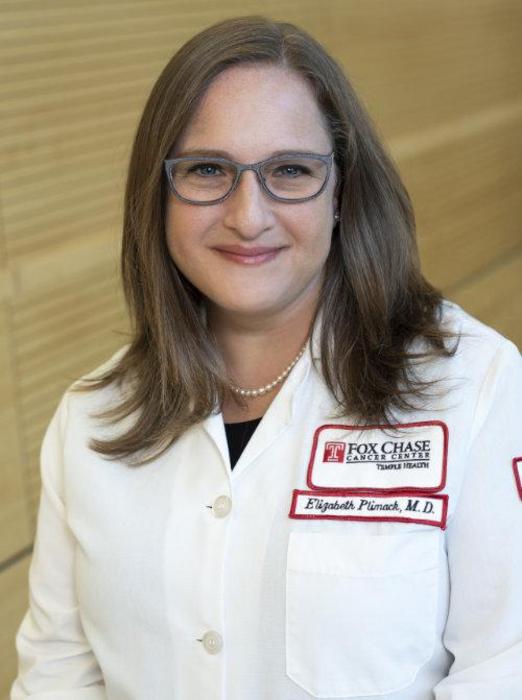An analysis of pre-treatment tumor specimens from 105 patients with localized muscle-invasive bladder cancer found that the presence of a mutation in any one of three genes, all known to be involved in DNA damage repair, was associated with complete pathologic response to cisplatin-based neoadjuvant chemotherapy as measured by pathological downstaging at the time of bladder surgery. Results are published in the journal European Urology.

Credit: Courtesy of Fox Chase Cancer Center
An analysis of pre-treatment tumor specimens from 105 patients with localized muscle-invasive bladder cancer found that the presence of a mutation in any one of three genes, all known to be involved in DNA damage repair, was associated with complete pathologic response to cisplatin-based neoadjuvant chemotherapy as measured by pathological downstaging at the time of bladder surgery. Results are published in the journal European Urology.
“The SWOG S8710 randomized trial provided Level 1 evidence supporting the use of neoadjuvant chemotherapy in eligible patients with muscle-invasive bladder cancer, but uptake was disappointing because the magnitude of the effect was considered modest,” said David James McConkey, PhD, of Johns Hopkins Greenberg Bladder Cancer Institute, senior author on the European Urology article.
“So we designed the S1314 COXEN trial to test whether a tumor biomarker known as the COXEN score could predict which patients had tumors that were likely to respond to neoadjuvant chemotherapy.” Primary results of S1314 were published in Clinical Cancer Research in 2021.
The new analysis used banked tissue samples from S1314 patients to test the complementary hypothesis that mutations in specific DNA damage repair genes were enriched in tumors that were sensitive to the drug cisplatin, and therefore tumors with these mutations were more likely to be eradicated (completely cleared) by cisplatin-based neoadjuvant chemotherapy.
Results of the analysis support this hypothesis. Patients whose tumors had a mutation in the ERCC2, ATM, or RB1 gene were more than five times as likely (compared to patients whose tumors lacked such mutations) to achieve a complete pathologic response to the chemotherapy, meaning that their tumors had disappeared by the time of surgery.
The authors suggest that a pre-treatment test for mutations in these three genes, when combined with careful clinical assessment, might be helpful in determining which patients can be considered for continued surveillance instead of bladder surgery. The RETAIN trial and other similar studies are now collecting data to test this hypothesis.
“The evolution of more effective systemic neoadjuvant therapies in conjunction with innovative tools such as urine-based tests for detection and monitoring patients on bladder surveillance will build on this work toward a goal of avoiding cystectomy in cases where radical surgery is not required to achieve cure,” said Elizabeth R. Plimack, MD, MS, FASCO, of Fox Chase Cancer Center, lead author of the new work.
Study S1314 was supported by the National Cancer Institute (NCI), part of the National Institutes of Health (NIH), led by SWOG Cancer Research Network, and conducted by the NIH-funded NCI National Clinical Trials Network (NCTN).
The new work was funded in part by a generous donation from the Family of George Zazanis, MD, to Fox Chase Cancer Center, and by NCI/NIH grants 3P30CA006927, U10CA180888, U24CA196175, and U10CA180819.
In addition to Plimack and McConkey, coauthors on the work included Catherine Tangen, SWOG Statistics and Data Management Center and Fred Hutchinson Cancer Center; Melissa Plets, SWOG Statistics and Data Management Center; Rutika Kokate, Fox Chase Cancer Center; Joanne Xiu, Caris Life Sciences; Chadi Nabhan, Caris Life Sciences; Eric A. Ross, Fox Chase Cancer Center; Erin Grundy, Nationwide Children’s Hospital; Woonyoung Choi, Johns Hopkins Greenberg Bladder Cancer Institute; Colin P.N. Dinney, University of Texas MD Anderson Cancer Center; I-Ling C. Lee, University of Texas MD Anderson Cancer Center; Megan Fong, Johns Hopkins Greenberg Bladder Cancer Institute; M. Scott Lucia, University of Colorado School of Medicine; Siamak Daneshmand, Norris Comprehensive Cancer Center and Keck School of Medicine, USC; Dan Theodorescu, Cedars-Sinai CANCER; Amir Goldkorn, Norris Comprehensive Cancer Center and Keck School of Medicine, USC; Seth P. Lerner, Baylor College of Medicine; and Thomas W. Flaig, University of Colorado School of Medicine.
Reference:
ER Plimack, et al. “S1314 correlative analysis of ATM, RB1, ERCC2 and FANCC mutations and pathologic complete response after neoadjuvant chemotherapy in patients with muscle-invasive bladder cancer.” European Urology, online July 14, 2024
SWOG Cancer Research Network is part of the National Cancer Institute’s National Clinical Trials Network and the NCI Community Oncology Research Program and is part of the oldest and largest publicly funded cancer research network in the nation. SWOG has 20,000 members in 45 states and nine other countries who design and conduct clinical trials to improve the lives of people with cancer. SWOG trials have directly led to the approval of 14 cancer drugs, changed more than 100 standards of cancer care, and saved more than 3 million years of human life. Learn more at swog.org, and follow us on Twitter (X) at @SWOG.
Journal
European Urology
Method of Research
Randomized controlled/clinical trial
Subject of Research
People
Article Title
Correlative Analysis of ATM, RB1, ERCC2, and FANCC Mutations and Pathologic Complete Response After Neoadjuvant Chemotherapy in Patients with Muscle-invasive Bladder Cancer: Results from the SWOG S1314 Trial
Article Publication Date
14-Jul-2024



